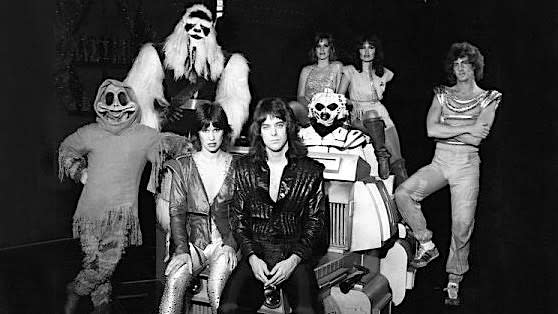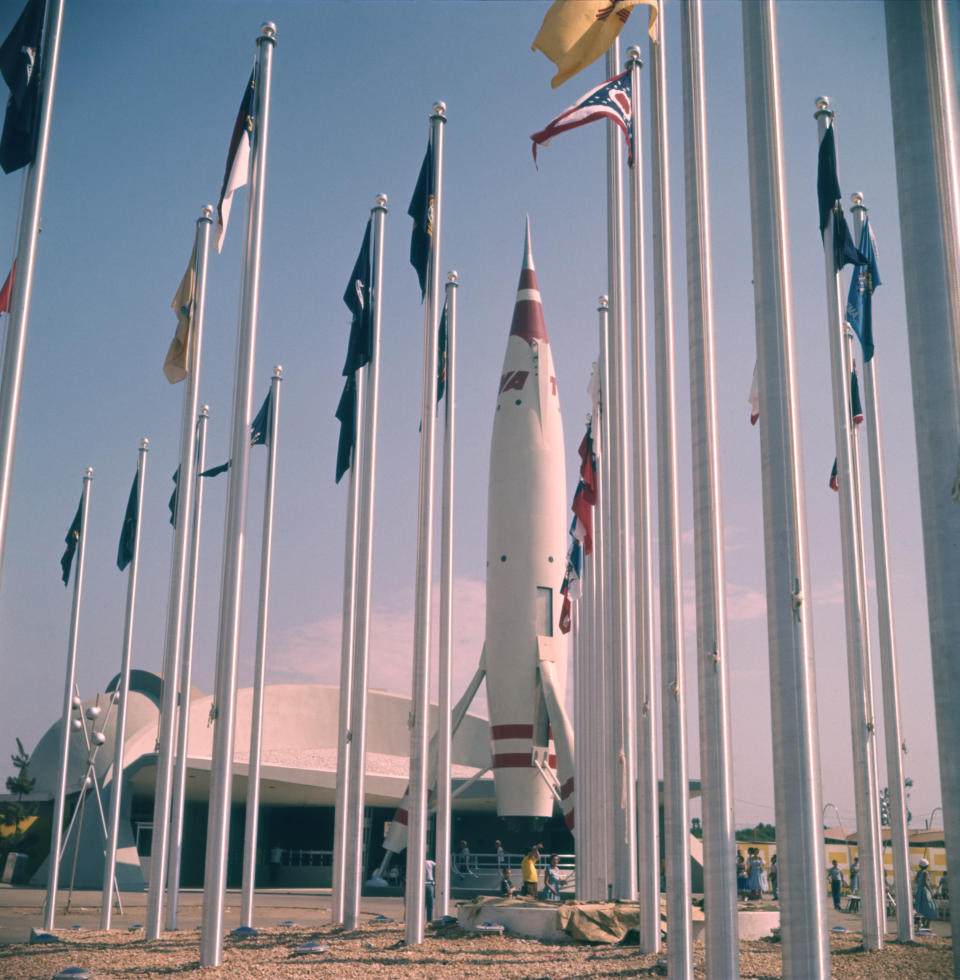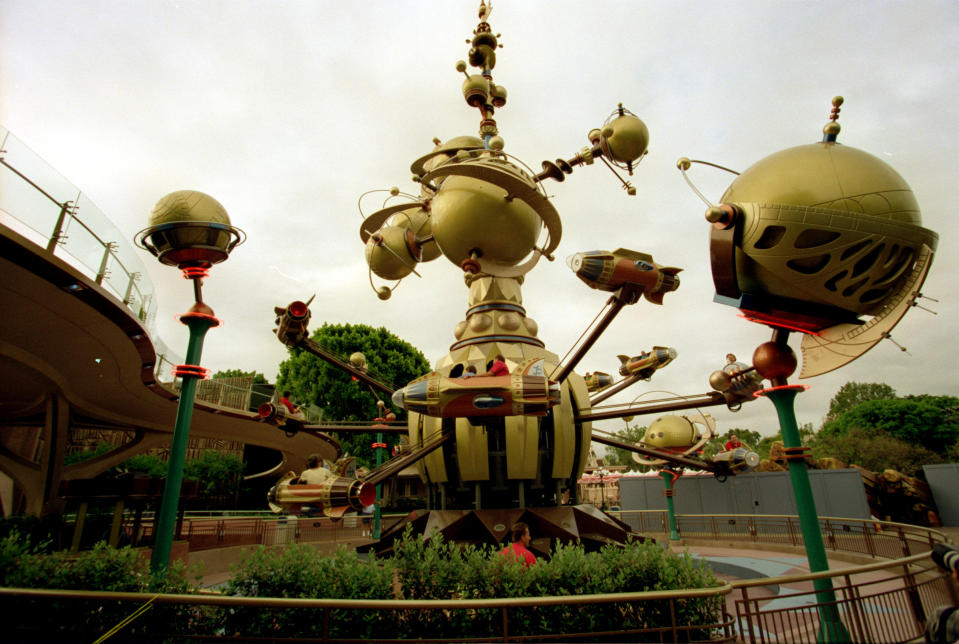Remembering Halyx, Disneyland's forgotten sci-fi group: 'The Star Wars Cantina Band meets KISS'

The year was 1981, and a glam-rock space brigade called Halyx ruled Disneyland — and was poised to rule the world.
They had a wailing, rock-goddess frontwoman in a Pat Benatar mullet and Suzi Quatro unitard, Lora Mumford, otherwise known as the “punk-rock Snow White.” They had a seven-foot-tall Wookiee bassist in a shaggy suit fashioned out of real yak hair.
They had a synthesiser-playing robot zipping around the subterranean Space Stage on some sort of intergalactic golf cart. They had a half-man/half-amphibian acrobatic percussionist who played a mean tambourine. Their live stage show was even overseen by Grammy- and Emmy-winner Mike Post, a TV legend known for his theme songs for Law & Order, The A-Team, The Rockford Files, L.A. Law, Magnum, P.I., and Hill Street Blues. With Post’s guidance, the sci-fi group’s shredding lineup of costumed consummate professionals easily carried out an ambitious, great-on-paper mission to basically become “the Star Wars Cantina Band meets KISS.”
And for one glorious, forgotten fever-dream of a summer, Halyx did just that, commanding the stage twice a day beneath Space Mountain (yes, there’s a stage beneath Space Mountain) at Tomorrowland.
Read more: Is Mulan based on a true story?
But then… it was all over. There was no tomorrow for Halyx. Disney pulled the plug on the bizarre project, no music was ever officially released, and the only people who were ever even aware of Halyx were those who’d been lucky enough to witness this space-age spectacle back in the day.
Until now.
Yes, thanks to producer Kevin Perjurer (creator of Defunctland, a popular YouTube channel dedicated to obscure theme-park history) and first-time director Matthew Serrano, the crowd-funded documentary Live From the Space Stage: A Halyx Story is finally giving Halyx the respectful, in-depth, Behind the Music-style treatment they deserve.
But making the doc, which can be streamed for free on Defunctland, wasn’t easy for the filmmakers, since nearly all evidence of Halyx’s brief, burning-bright existence had vanished.
“We were looking online to find out if there was any more information,” Perjurer tells Yahoo Entertainment/SiriusXM Volume, recalling the magical moment when his “mind was immediately blown” upon finding out about Halyx via a podcast called The Ride. “But it came to a halt because there was pretty much two blog posts about it, and then a couple of photos and some audio recordings — and that was really it. And that's where the fun began.”
Read more: The most controversial Disney songs
“I'm surprised at how much we were able to find, actually,” admits Serrano. “It was pretty crazy, because pretty early on, we were able to get confirmation from Disney archivists that they had nothing. And so immediately it was like, ‘Well, if Disney doesn't have anything, where are we going to find our stuff? How are we going to tell the story? Are we going to have to recreate the concert footage in animation, dramatise it? What are we going to do?’ And so slowly over time, in the most surprising ways, the archival material kept pouring in.
“For example, we didn't think that there would be any concert footage until four months in, when I finally found the drummer [Brian Lucas] on Facebook Messenger. He goes, ‘Oh yeah, I was just watching the footage the other day…’ And my heart stopped. Or like, most of our photos that we used are from one guy who was going to every one of their concerts to practice his concert photography.”
“This was one summer. I think they played for less than a hundred days or something like that,” Perjurer elaborates. “So it was not something that was archived. In the ‘80s, [Disney was] throwing records away and nobody was archiving anything, really — especially something that didn't end up working out.”
So, why didn’t Halyx work out? After all, they totally had the chops and stage presence. “They were just really good. I think that's the most surprising thing when people watch the movie. That was most surprising thing for me when getting the footage,” says Serrano.
“Lora was an incredible singer. There’s a point in the documentary where you hear her belt out at the end of a song for like 20 to 30 seconds, and it is incredible. … And then there’s Tony [Coppola], who's the frog-man playing tambourine upside down on a rope, which is pretty great; at one point in one of their performances, this little frog guy from across the stage tosses the tambourine to Lora, and she perfectly catches it. … And then [synth player] Thom [Miller], he’s blind in one eye. So imagine being a keyboardist, and you're blind in one eye and you have this giant helmet on, so you’ve got tunnel vision. And he's doing full-on keyboard solos and programming on a Prophet 5, driving this cart around and doing this crazy stuff.”
The prefab band also, at least theoretically, had a captive audience of potentially thousands of tourists at Disneyland, where they were dispatched to hone their stage skills before entering the recording studio. (While the project had initially been conceived by Disney Records executive Gary Krisel as a movie pitch, Krisel wanted Halyx to record an album and hopefully repeat the success of the label’s 1979 triple-platinum smash, Mickey Mouse Disco.) But the powers-that-be at Disney, and at the theme park itself, were largely anti-Halyx… which, come to think of it, just made the project all that more authentically rock ‘n’ roll.
“What I want to point out is this was not the ‘Disney empire.’ This was 1981, three years away from Disney almost being bought out, sold off, and split in 1984, which was the big watershed year for Disney and Michael Eisner and Jeffrey Katzenberg, and Frank Wells coming in and basically taking Disney into the ‘80s and ‘90s,” says Perjurer.
“That's when they began to acquire everything ABC and all that to become the empire that they are. But in the ‘80s, they were disjointed. It wasn’t even 15 years since Walt Disney passed away, and everybody was still all about, ‘Oh, we're going to do what Walt wanted to do.’ So this kind of idea was not welcomed, necessarily. This was not a conscious effort by the Walt Disney Company. This was a small group of people at Disney Records, which was the worst-performing division of the Walt Disney Company.

“So you have this little company of these people that are basically laughed at throughout the entire rest of the Disney organisation, and you have a Disney organisation that is resistant to change and resistant to new ideas, and then this little team forms the wildest idea they could possibly think of. And they push it forward.”
“Disneyland was opposed to the idea. They hated them. Hated them! They would get so mad about them playing loud music and singing about jailbait,” says Serrano. “The band really had a hard time with dealing with the fact that they wouldn't allow people to get up and dance at the Space Stage, because they wanted it to be a seated venue — which is understandable, but kind of ridiculous at the same time. It was just like lots of different cultural things. Disney has a dress code, a hair code and makeup code and tattoo code, and so they had to make exceptions for some of the band members — because all of the band members were walking into work, working at Disneyland, and they all had long hair! And the security guards were [hassling] them.”
Oh, yes… and then there was that above-mentioned “Jailbait” song, which somehow got past any Disney censors who might have actually been paying attention to Halyx. It’s hard to fathom how such a politically incorrect song got the greenlight to be performed at a children’s theme park attraction, but the early ‘80s were clearly a very different time.
“So, not that it makes it better, but I think it was a 19-year-old woman talking to a 17-year-old boy [in that song],” groans Perjurer. “I'm not saying it's right. I'm just saying it's not as bad as it could be. It's still bad. The lyrics do not make that clear. There's no age mentioned. … It was originally written by Jeannie Cunningham, a songwriter in L.A. who sent in a bunch of demo tapes to Disney Records. And the one that resonated with them was ‘Jailbait,’ because it's a catchy song. It's a fantastic song, if you can ignore the lyrics, which did not age well — but they were also were not good back then!”
“And to really add to the catchiness factor, if you listen to that demo tape that she plays in the movie, it sounds like Huey Lewis. But we do have confirmation from [Cunningham] that that was the original intention of the song,” Serrano adds with a roll of his eyes. “What's funny was the message is doesn't come through, but it's supposed to be a political statement — you know, you have a female songwriter in the ‘80s that sees all of these ‘jailbait’ songs being written [by male artists about young girls], and she told me that her intention was to flip the script and kind of make it edgy in that way and forward-thinking. Which now is almost laughable.”
Inappropriate lyrics and lack of Disneyland infrastructural support aside, Halyx did find a core, cult audience during that halcyon summer. “If you watch the audience [in the concert footage], the audience was eating it up,” Serrano marvels. “They had a crazy, dedicated fanbase. This was before annual passes, so if you wanted to see Halyx [in concert], you had to buy a ticket for the evening or for the day, and you had to make plans to go see them. They had — before the internet – [superfans] who were getting together, creating group dances that they would do in their seats because you weren't allowed to dance at the Space Stage. I mean, the kids were making their own fan merch. They were that dedicated to the band.” It’s likely that some of these old-school devotees were among the contributors that helped fund Live From the Space Stage, when the movie quickly surpassed its $10,000 goal on Indiegogo.
As mentioned earlier, very few actual Halyx artefacts exist, which makes Live From the Space Stage all the more important for the fans that fondly recall the band. “Sadly, I found out from the stage manager at the Space Stage that she saw them dismantling the robot keyboard cart the day after they wrapped their last performance. Disneyland wanted them gone,” says Serrano, who also confirms that any demos are “not in Mike Post's basement, not in Gary Krisel’s house.” (Serrano is still in search of a Halyx holy grail of sorts: a shelved song that the band had ostensibly recorded for a little-seen local TV commercial advertising their Tomorrowland residency.) Even the famous Wookiee suit is gone now, although that one collectible did get special treatment for a while.

“[Bassist Roger Freeland] talks about in the film how he would lose five to 10 pounds of water weight every night — and he's a skinny guy already — after two 30-minute performances,” Serrano laughs of that suffocating furry costume. “But we do know that [Disney executives] were really, really proud of the Wookiee suit. I mean, when you look at the photos and the video, it's really impressive. It looks really, really good. It did not look like there was a bassist trapped in a Wookiee suit. It looked like there was a space bear rocking out on the stage in front of all these people, rocking the bass. So, they apparently tried to keep up that costume as long as they could. But slowly over time, it just fell apart.”
Both Serrano and Perjurer speculate that if Halyx could have lasted just a little while longer, they might have broken out nationally — because only about a month after they disbanded, the ideal showcase for their far-out visuals, the MTV cable network, premiered on 1 August, 1981. But despite the project’s failure, they do believe that Halyx altered the course of Disney pop music history.
“This was before, or right at the beginning, of [teen discotheques] Studio K and Cloud 9 at [rival Orange County amusement park] Knott's Berry Farm, which were two huge ‘80s nightclubs. And then we had [Disneyland nightclub] Videopolis, four years after Halyx. So you started to have these teenagers moving into the theme-park space, and Halyx was one of the first pushes for that,” Perjurer points out.
“And it's like [Miley Cyrus’s Disney-created pop star] Hannah Montana — if they were going to aim Halyx at teens, I think it could have kicked in, because look at the Jonas Brothers and all those bands. That's what's interesting about Halyx: It was the precursor to the same company, the same Disney Records.”
“So when you watch the Cheetah Girls on Disney+, you can thank Halyx,” quips Serrano.
Watch the full Live From the Space Stage: A Halyx Story documentary below:
Follow Lyndsey on Facebook, Twitter, Instagram, Amazon and Spotify
The above interview is taken from a portion of Kevin Perjurer and Matthew Serrano’s appearance on the SiriusXM show “Volume West.” Full audio of this conversation is available on demand via the SiriusXM app.

 Yahoo Movies
Yahoo Movies 

